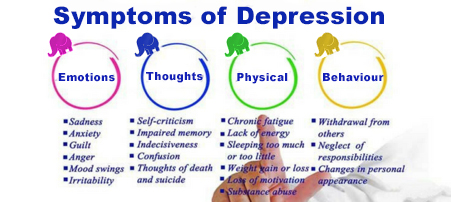Depression
Depression is more than simply feeling unhappy or fed up for a few days. Most people go through periods of feeling low but depression is marked by periods of persistent sadness which might last for weeks or months. People can feel sad or empty, they might lose interest in daily activities. In some cases people may think about suicide.
Symptoms of depression also include difficulties sleeping, or even sleeping too much, anxiety, anger, unexplained physical symptoms such as migraines and muscle pain, changes in eating, for example overeating or food avoidance.
If you are suffering from depression you may have some difficulty dealing with daily stresses. Maybe getting out of bed is difficult at times, leaving you feeling overwhelmed and alone. Perhaps even old pleasures have lost their shine.
If depression is affecting your life counselling can give you a space to talk and sort through your emotions.it

Counselling for depression
Daily life is full of ups and downs but when the downs persist you could be depressed. Depression is very common, most of us will experience some low mood sometime in our life. The World Health Organisation (WHO) says that one in five of us will experience it at some time in our lives. It ranks second after heart disease as the biggest health concern of our time.
When it stops us enjoying life and makes interest in day to day activities is may be time to seek psychotherapeutic help. Depression can be difficult for the person experiencing it as well as those who live and work around them. Talking to a psychotherapist or counsellor when depression does not lift after a period of time can help you work out why the symptoms remain present in your life.
How do I know I am depressed?
If a period of feeling low is not shifting and your usual pattern of recovering shows no signs of returning you may be feeling depressed. Some signs you might be feeling depressed are shown below…
- Feeling helpless or worthless.
- Eating more than usual or neglecting to eat at all.
- Tiredness and lack of energy that are not usual for you.
- Insomnia, broken sleep or excessive sleeping.
- Feeling hopeless.
- Inability to concentrate.
- Lack of interest in daily activities which would usually be enjoyed.
- Persistent sadness and low mood.
- Isolation – not able to let friends and family know we do not feel good.
- Feeling like life is not worth living.
- Constantly feeling anxious, tearful and worried.
- Feeling irritable and intolerant of others.
What causes depression?
It might be clear to you why you feel depessed, perhaps you have suffered a loss or other difficult life event. At other times it might not be so clear why depression has emerged. Reasons might include some of the following…
- Bereavement – feeling depressed after a loss of a loved one is common. When that feeling does not improve with time it may be that you are suffering with depression.
- Divorce or family break up – depression as a result of divorce, break up or other change in family circumstances.
- Job loss – we spend much of our lives in work, so when a job is lost for whatever reason confidence can be lost and depression can arise
Childhood trauma – experiences in childhood including abuse, bullying and other traumas can plague us later in life leading to depression. - Financial difficulties.
- Challenging life circumstances.
- Illness, e.g chronic illness or life limiting conditions.
Types of depression
- Major Depression or Clinical Depression – this is where symptoms of depression persist most of the day, most days of the week for at least 2 weeks that affect your ability to sleep, eat, work and enjoy life.
- Post-natal Depression – Women experience a major depression after delivery of a baby.
- SAD – Seasonal Affective Disorder is a type of depression that is connected to the seasons, typically starting in the autumn and persisting through the winter months, when the light is lower than other months. This type of depression is often much improved in the spring and summer months.
- Dysthmymia (Persistent depressive disorder) – ongoing symptoms of depression that last for two years or more.
- Psychotic Depression – a particularly severe type of depression that that involves psychosis, for instance delusions, hallucinations and disturbance of thoughts that cannot be otherwise explained.it
Should I see my GP?
Yes, it can be helpful to let your doctor know how you are feeling. There may be a physical cause for your low mood and the doctor can carry out the necessary tests if applicable. The doctor may also talk to you about possible medication. Psychotherapists and counsellors do not manage medication but instead provide a space to think about and work through your feelings so you can recover.
How does therapy help with depression?
Seeing a counsellor can help you explore why it may be present in your life right now so that you can consider how to manage and recover. Psychodynamic counselling helps people suffering from it to consider what unconscious thoughts might be affecting their behaviour. This type of counselling can help people understand and unpick any deep-rooted feelings and experiences they may have.
By understanding how behaviour and mood are affected by unresolved issues and unconscious feelings, psychodynamic therapy helps individuals recover. Some clients find short term counselling is all they need, while others continue therapy long term to work with deeper problems.
Private Counselling provides an introduction to depression including the following possible causes: post-natal , major depression, clinical, bipolar disorder, trauma, bereavement, and divorce. Samantha Merry is a private psychotherapeutic counsellor offering counselling and psychotherapy in Bromley, Kent.

